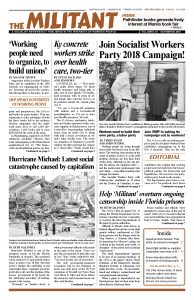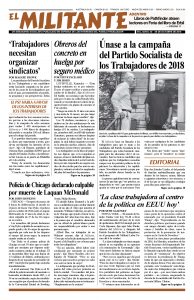LONDON — It has been two and a half years since a referendum on the U.K.’s membership in the European Union recorded a 17.4 million to 16.1 million majority for Brexit. Millions of workers took advantage of the ballot to register a protest against how the bosses and successive governments have made them pay for the crisis of British capitalism.
The backdrop was the sharpening competition between capitalist rulers worldwide, which is tearing apart the fabric of the European “Union.” The propertied rulers in the U.K. are fighting over how to protect their interests and find a place in this world in the face of their accelerated decline.
U.K. Prime Minister Theresa May has opted for what’s been dubbed “Brino” — Brexit in name only. Though London’s offer would commit the government to pay billions of pounds into EU coffers for years, each proposal they’ve made has been rejected by EU negotiators under instruction from Berlin and Paris.
May submitted a package of proposals to the European Union summit in Salzburg, Austria, Sept. 19-20. The package provided for continued customs-free trade in goods and committed the U.K. to “continued harmonization with the EU.” It would end the automatic right of workers in EU member states to enter and work in the U.K. and would also allow London to pursue other trade deals. “It’s not so easy to leave the EU, it’s not without a cost,” said French President Emmanuel Macron, explaining the summit decision to reject the package.
The proposal had already split May’s cabinet. Foreign Secretary Boris Johnson, who wants to replace May as Conservative Party leader, was one of four ministers to resign. He said her course wasn’t a realistic alternative, describing it as an “outrage” that would leave Britain “locked in the tractor beam of Brussels.”
Johnson speaks for the wing of the British ruling class who think the road for British capital is a sharp, clean break, seeking to bind their future more closely with a “special relationship” with Washington and with the Commonwealth countries — former colonies of the U.K. Others in the capitalist class have sought to reverse the referendum vote altogether in an attempt to hang onto current trade and political relations in the EU. The Conservative and Labour Parties and the government itself have been wracked by division over which way to go.
Since Salzburg, May has signaled willingness to get down still further on her knees to the German rulers, who gain most from the EU setup and dominate its operations. She has offered a continued customs union for years after the scheduled Brexit breakup on March 29, 2019.
May hopes she can overcome inevitable opposition from some Conservative Members of Parliament by gaining backing from opposition Labour MPs. “If you [May] deliver a deal that includes a customs union and no hard border in Ireland,” leader Jeremy Corbyn pledged at the Labour Party’s September conference, “then we will support that sensible deal.”
The Irish border question has been a stumbling block. Rulers of countries in the EU, and most bosses in Ireland, want to ensure that despite Brexit a free commercial flow will continue across the border. But many Conservative Party MPs, along with the Northern Ireland Democratic Unionist Party, which props up May’s minority government in Parliament, say they will not accept any deal that treats Northern Ireland differently from the rest of the U.K.
Labour has called for a new referendum, a “people’s vote,” in an effort to overturn the previous “people’s vote.”
“They want us to vote over and over until we vote the way they want,” Colin Johnson, a retired engineering worker in Harlow, Essex, told the Militant when members of the Communist League knocked on his door.
EU bloc being pulled apart
The protectionist bloc that is the EU is being pulled apart as national member governments defend the divergent interests of their respective ruling families. Recognizing the centrifugal forces, Paris proposes the EU implement a “multispeed” Europe of “concentric circles” to entrench a stronger position for France. A core of more powerful states that share the euro as their currency would form the center, locked together with a common budget, finance minister and parliament. The U.K. would be exiled to an outer zone, along with Moldova, Ukraine, Russia and Turkey, all of which are, or will be, outside the EU and use their own currency.
Macron’s proposals are anathema to governments in Italy, Hungary and elsewhere, that would face greater competition and pressure from anything that smacks of further integration.
Berlin is also “diametrically opposed” — for different reasons. Looking to safeguard Germany’s domination of the whole 27-country bloc, Chancellor Angela Merkel has no interest in relinquishing the German capitalist rulers’ control.
“When a German says ‘banking union,’ he means having German accountants lay down the law to banks in Greece,” Christopher Cauldwell wrote in the Weekly Standard in August. Greek workers and farmers have paid a steep price for this kind of “union.” The country’s economy has shrunk by 25 percent, pensions and benefits were slashed, and youth unemployment stands at 44 percent. Meanwhile, Greek government debt has increased by over 40 percent since 2009 with German banks coming out the winners.
Washington and Moscow
Washington and Moscow are adding to the pressures. U.S. President Donald Trump has called into question both the EU and NATO, pointing to how the European capitalist rulers survive and enrich themselves by relying on the Pentagon as their army. This allows them to go after Washington — and each other — to jockey for trade and profits without having to pay for defense.
Merkel responds that Europe must “take its destiny into its own hands.” But Germany’s armed forces are in a pathetic state. And there is no common foreign policy among rival EU member governments — each jealously guards its national veto.
The German capitalists are heavily dependent on Russian gas for power and are committed to the Nord Stream 2 pipeline project that is under construction. But in July, after the White House flexed its preeminent economic muscles, President Trump and EU President Jean-Claude Juncker announced a trade agreement in which Europe would increase purchases of U.S. liquid natural gas.
In addition to being a blow to the German rulers, this caused a strong reaction from Macron, who cares most about defending French agribusiness from U.S. competition. This doesn’t mean he seeks to protect French farmers. The profits are raked in by giant French commercial trusts that monopolize trade and banking.
Every move in one direction sharpens the EU divisions in another. The fact is there is no “Europe” in anything other than a geographical sense. The competition and differentiation there, part of the inevitable workings of capitalism, continue to tear it apart.

